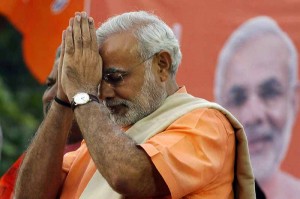Manali Desai, who is currently researching the politics of reform in India, discusses Gujarat Chief Minister Narendra Modi’s prospects as a national leader. This interview, conducted by Aditi Phadnis, first appeared in the Business Standard.
Q. You have been doing fieldwork in Gujarat for several months now. Did people vote for BJP or Modi?
A. Of the people who were intending to vote for BJP, most cited Modi as the main reason. Of course, there are loyal BJP constituencies, but Modi seemed to inspire them more than the party itself. It is clear that Modi represents a kind of assertion, not just in the sense of Hindu or Gujarati pride. He has created a feeling amongst people that he can personally deliver a way out of their circumstances. Many of the poorer urban communities we spoke to seemed to think that he was doing great things, although once we probed deeper, it was unclear exactly what they felt he or the government had done to make life better. Thus, he may have created strong expectations that might require a considerable effort to fulfil. Among the middle classes Modi is a hero, there is no doubt about that whatsoever. I don’t think they are much concerned with BJP itself—it is all about Modi.
Q. What is a Gujarati’s biggest source of social or political insecurity today?
A. Security was the paramount concern that came out in our interviews, although people defined it in very different ways. Many of the Hindus we spoke to, mostly from poor, lower caste communities, felt that communal violence affected them more than the middle class because it deprived them of their livelihoods. Year 2002 had clearly caused severe hardship for them. We heard repeatedly that Modi had made Gujarat ‘safe’ after 2002 because there has been no violence for a decade. It is interesting that despite this sense of greater security, most of our interviews showed how precarious life is for 90 per cent of Ahmedabad’s workforce, which is employed in the informal sector.
As far as political insecurity is concerned, the perspective of Muslims was the polar opposite to that of Hindus. For them, economic insecurity was compounded by deep political insecurity and marginalisation after 2002. The families we spoke to felt that they had been completely forgotten and continued to be victimised by the government. Development had no meaning in their lives.
Q. Modi’s move to Delhi is not a matter of if, but when. What will the Modi effect be on Indian society and politics?
A. Modi is a controversial figure, not least within BJP. There will be a leadership struggle within his party, and it is not as yet clear how this will play out. However, if he were to pitch himself as a national leader, he would have to speak a very different language from the one that has brought him to power in Gujarat. In particular, his perceived lack of concern for minorities will go down poorly on the national stage. Modi is undoubtedly a charismatic leader, and his oratory is in no small part responsible for his popularity. But when the question of delivery arises, he will have to prove that his concept of vikas (development) is truly inclusive.
Although he can claim some success in urban areas, it is rural development that may haunt him. BJP has lost seats in Saurashtra and other parts of rural Gujarat, where farmers are facing debt, drought and economic insecurity. His opponents in the Congress have a stronger edge in rural India. We must also remember that BJP lost two successive elections in 2004 and 2009 because it was perceived as biased towards the urban middle classes. Can BJP under Modi reinvent itself in a manner that will convince voters otherwise? I am sceptical about that.
Manali Desai is Senior Lecturer in Political Sociology at LSE’s Department of Sociology.









We have launched a petition to request President Obama to reconsider US Administration’s stand on Mr. Narendra Modi, the Chief Minister of the State of Gujarat, India.
Please visit http://www.modi360.com to review and sign this petition.